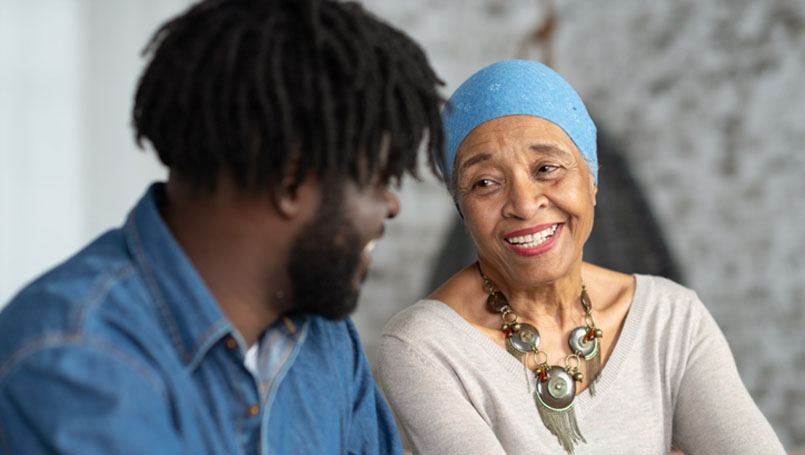Tuesday, June 28, 2022

When someone tells you they have cancer, whether it’s a family member, friend, colleague or neighbor, it’s natural to want to offer support. But what might not come quite as naturally is knowing the best ways to do so.
According to the American Cancer Society, studies have found that cancer patients who receive strong emotional support have more positive outlooks and report a higher quality of life. How can you support someone with cancer? Here, with the help of Dr. Maha Saada Jawad, radiation oncologist and radiology oncology residency program director for Beaumont Health, is advice on what you can say or do — and just as importantly what not to say or do.
What to do
Take time for yourself. This may be counterintuitive, but before you can help anyone else, you need to process the diagnosis yourself, especially if it’s someone close to you. “First, get your head around it mentally, because it’s going to be hard for you to hear and deal with,” says Jawad. “Get yourself in a good headspace to emotionally support the other person. It’s not helpful if you put your own fear and anxiety on them.
What every person wants or needs is highly individualized, according to Jawad. Some people may not want to share their diagnosis with others, while other people may find strength in getting support from as many people as possible.
“If it’s someone close to you, you probably already know how they are as a person and whether they keep things to themselves or not,” says Jawad. “Every person is so different, the approach really needs to be tailored.”
Partake in some research. Use reliable resources such as the American Cancer Society and the National Cancer Institute to find out more about the specific cancer the person in your life is dealing with, along with its treatments and outcomes.
Ask what they need. The best way to find out how you can help is to simply ask. “Ask the person what they need and if they want to talk. Then give them space to answer your questions,” says Jawad.
You can offer to accompany them to medical appointments, get groceries or watch the kids, but let it go if they say no. “If you ask and they say they don’t need anything, it’s important to listen and not push it,” adds Jawad.
Ask how they are. This is one way to offer support, particularly for people you might not be close to, such as a work colleague or neighbor you only see in passing. Jawad suggests asking them how they are feeling or how treatments are going, then adding that you understand if they don’t want to talk about it.
“You can also still offer to help and ask if you can take anything off their plate,” she says. “They probably won’t take you up on it, but it’s nice to hear someone is thinking about you.”
Continue to include them in plans. Most people with cancer want to be treated the same way they were before diagnosis, so it’s important to continue to offer invitations to do things — but with no pressure attached.
“Don’t assume they’ll be too sick to go out. Include them as you would normally but be aware they may not be able to commit or may need to cancel at the last minute if they don’t feel well,” says Jawad.
What NOT to do
Bring up others who’ve had cancer. Jawad says she will often hear family members and friends tell cancer patients about someone they knew who had cancer or similar treatments and "did just fine." But that is a no-no.
“Everyone’s cancer is different and everyone’s treatment is tolerated differently, so don’t compare,” she adds.
Offer unsolicited advice. In this internet day and age, it’s very common to share something you’ve read or something you’ve heard worked for someone else — but don’t. First, you don’t want to inundate an already overwhelmed patient with more information, says Jawad.
Second, the advice probably isn’t helpful because there are very specific ways doctors manage patients’ treatments and side effects. “Allow the person to make a treatment plan with their physician. Don’t share something you read online or something someone three times removed from you recommends,” says Jawad.
Ask questions that cause guilt. Don’t ask someone why they got cancer or about behaviors tied to their cancer — for example, asking a lung cancer patient if they smoke. All this might do is make the other person feel guilty — and it’s also not right to ask someone to share personal information.
Let feelings flow
The best overall thing you can do for someone with cancer is let them express whatever it is they’re feeling, says Jawad.
“Allow them to talk. Allow them to cry. Allow them to vent. Allow them to be happy,” she says. “Allow them to have every emotion they need to have. Let them know you’re there for them and let them feel how they want to feel.”
Finally, remember that most cancer centers and clinics have support groups for family and friends of patients, along with individual organizations such as Gilda’s Club — so don’t be afraid to ask for ways to get help if you feel you need it. You can also visit the support organization CanCare or Gilda’s Club.
This story originally appeared in the Detroit Free Press 2022 Cancer Guide.
